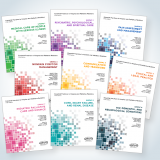Essentials Book Set (includes books 1-9)

Essential Practices for Hospice and Palliative Care, 5th Edition (previously named the UNIPAC series) is the foundational resource for hospice and palliative care professionals.
Category
- Academic/Education Strategies
- Regulatory/Public Policy
- Pediatrics
- Pain Management
- Non-Pain Symptom Management
- Medical/Clinical Knowledge
- Hospice
- Disease Trajectories and Prognosis
- Core Content
- Communication/Teamwork
- Business Practice/Program Management
- Board Prep
Format
- Paperback Book (shipped)
Credits
Communications Micro-Learning Flight: Keeping the Connection: Addressing Challenges in Communicating Behind the Masks

Join Rachelle Bernacki, MD MS FAAHPM AGSF, Miguel Paniagua, MD and Stephanie Kiser, MD MPH in this Communications Micro-Learning Flight consisting of three 15-minute micro-learning sessions envisioned to address the pandemic challenges in delivering one of our most vital medical interventions: communication. This activity is designed to share novel skills we have put into practice for communicating "behind the masks", as well as reinforce existing communication principles which are now increasingly vital to providers throughout the healthcare system.
Category
- Academic/Education Strategies
- Communication/Teamwork
Format
- Video
- Self Study
Credits
- 0.75 ABIM MOC
- 0.75 CME (physician only)
- 0.75 Participation
Improving Public Messaging about Advance Care Planning, Palliative Care, and Hospice using Evidence-Based Principles

Messaging to the public regarding advance care planning, palliative care and hospice is inconsistent and confusing. Hospice and palliative care specialists are often asked to talk to the public about care for people with serious illness, but most have received little or no training in public messaging or media engagement. This activity reviews the need for improving public messaging about advance care planning, palliative care, and hospice along with the empirical evidence for public attitudes and awareness of these aspects of care for serious illness.
Category
- Academic/Education Strategies
- Research/Quality Improvement
- Hospice
- Communication/Teamwork
Format
- Subscription
- Video
- Self Study
Credits
In Bad Faith: The Influence of PROP and CDC on Failed National Opioid Policy

Diligent analyses of the causes of overdose deaths attributed to opioids have shown that illegal drug - especially illicit fentalogues and heroin - are the driving force behind these deaths, rather than prescription pain medications. The discussion explores on the negative effects of the CDC Pain Guidelines for patients in chronic pain, including those receiving palliative care, and it offers insight into serious concerns and hopes for balanced national opioid policy in the future.
Category
- Pain Management
- Communication/Teamwork
Format
- Video
- Self Study
Credits
- 1.00 CME (physician only)
- 1.00 Participation
Doctor, Our New Hospice Admission is in Pain! Should I Continue that 32 mg of Buprenorphine or Not?

Substance use disorders (SUD), and especially opioid abuse disorder (OUD) with resulting overdose-related deaths, constitute one of the most significant health crises of modern times.
Category
- Academic/Education Strategies
- Research/Quality Improvement
- Pain Management
- Communication/Teamwork
Format
- Subscription
- Video
- Self Study
Credits
Our Stories: Transgender and Non-binary Professionals On the Essence of Person-centered Care

In this moderated panel discussion, transgender and non-binary professionals will share their own life experiences and recommend affirming practices for communicating with and caring for people in this diverse community.
Category
- Academic/Education Strategies
- Research/Quality Improvement
- Pain Management
- Communication/Teamwork
Format
- Subscription
- Video
- Self Study
Credits
Advanced Pain Management Course Recording (2022)

Practices for prescribing and titrating opioid infusions vary widely, including within the field of hospice and palliative care.
Category
- Research/Quality Improvement
- Pain Management
- Medical/Clinical Knowledge
- Core Content
- Communication/Teamwork
- Resilience and Well-Being
Format
- Video
Credits
Intensive Review Course Recording (2022)

PRE-PURCHASE NOTICE: It is anticipated that the 2024 recording of the Intensive Review Course will be available for purchase in Q4 2024 pending the recording quality supports optimal on-demand learning.
Category
- Research/Quality Improvement
- Pediatrics
- Medical/Clinical Knowledge
- Hospice
- Core Content
- Communication/Teamwork
- Board Prep
- Resilience and Well-Being
Format
- Video
Credits
Speaking the Same Language: Bridging Cultural and Linguistic Barriers in Palliative Care

Hospice and palliative care providers recognize the value of effective communication to facilitate exploration of patients' and families' values and goals; however, many providers struggle to perform these key tasks when patients cannot communicate in English or have cultural norms which differ significantly from their own. Concepts such as autonomy and patient self-determination, 'truth telling'/disclosure of difficult news, shared decision making, as well as the acceptability of various treatments and communication techniques may present invisible barriers for palliative care providers working across cultures.
Category
- DEI: Addressing Disparities/Advancing Equity
- Communication/Teamwork
Format
- Interactive Enduring Activity
Credits
- 0.50 ABIM MOC
- 0.50 ABP MOC
- 0.50 CME (physician only)
- 0.50 Participation
Lessons from a Therapist’s Chair: Optimizing Palliative Communication through Psychotherapy Best Practices and Skills

The use of communication as a therapeutic tool is an essential piece of both palliative medicine and psychotherapy. The approach with which communication is conceptualized and taught, however, is markedly different between the two fields.
Category
- Communication/Teamwork
Format
- Interactive Enduring Activity
Credits
- 0.50 ABIM MOC
- 0.50 CME (physician only)
- 0.50 Participation

 Facebook
Facebook Twitter
Twitter LinkedIn
LinkedIn Forward
Forward